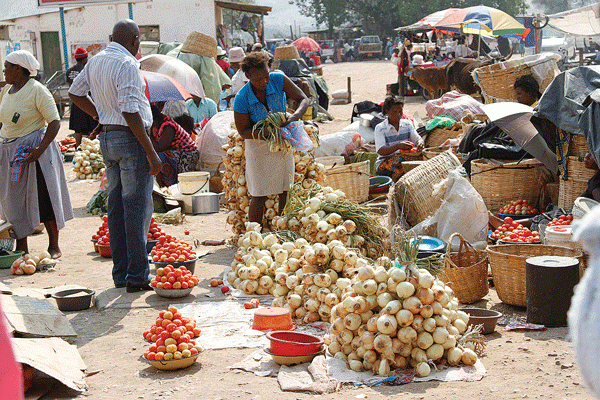
Curio vendors operating outside Bulawayo City Hall recorded brisk business as thousands of people descended on the city to mark the annual King Mzilikazi commemorations, a vibrant cultural event dedicated to preserving and celebrating Ndebele heritage and identity.
Held every year in early September, the commemorations honour the legacy of King Mzilikazi kaMatshobane, the revered founder of the Ndebele nation.
Mzilikazi led his people on a historic migration from present day South Africa to settle in southwestern Zimbabwe in the 19th century.
Today, the event draws traditional leaders, cultural enthusiasts, local residents and members of the Ndebele diaspora, transforming Bulawayo often referred to as Zimbabwe’s cultural capital into a hive of activity.
This year’s commemorations brought a rare economic boost to informal traders, particularly curio and food vendors who benefited from the influx of visitors.
As early as 7am last Saturday on the main day of the commemorations, hundreds of people could be seen gathering in traditional Ndebele attire and headgear at Matshobana, the starting point for the commemorative procession.
Members of the royal family, chiefs, and cultural groups led the colourful march to Bulawayo’s City Hall where buses were on standby to ferry attendees to Mhlahlandlela, the sacred site where the main ceremony was held.
Among those who reaped big from the event was Shelton Gumede, a local vendor, who specialises in Ndebele traditional wear and cultural artefacts.
- King Mzilikazi memorial lecture on cards
- Byo residents protest over ‘exorbitant’ rates
- Byo vendors, council clash over vending bays
- Mlalazi shares story of faith in new offering
Keep Reading
“I have been preparing for this event since last year,” said Gumede, visibly excited.
“I stocked various traditional outfits, beadwork, and souvenirs.
“By Friday, before the main event, I had completely run out of stock.
“I’ve been participating in these commemorations for several years now, but this was by far the busiest.”
Gumede said she made over US$400 just from selling headgear, T-shirts, and shields.
Another vendor, who identified herself only as MaMoyo, said the demand was overwhelming.
“The whole of Friday and Saturday I barely had time to sit down,” she said.
“I had to rush back home to fetch more merchandise because everything I had sold out quickly.
“People came from all over South Africa, Botswana, and other parts of Zimbabwe and they all wanted to take a piece of Ndebele culture back with them.”
The commemorations also proved lucrative for food vendors who served traditional dishes to the swelling crowds.
“I really wish these commemorations could happen more often,” said a vendor selling isitshwala/sadza with beef stew and traditional dishes.
City authorities and organisers praised the turnout and the positive economic ripple effect created by the event.
The Mzilikazi Commemorations Committee was pleased with the growing popularity and impact of the commemorations.
“This is exactly what we want, to preserve the legacy of uMzilikazi while empowering our people economically,” a member of the committee said.
The commemorations featured traditional dances, poetry, music, and speeches highlighting King Mzilikazi’s legacy and the importance of preserving the Ndebele language, customs, and values.
As the sun set on Mhlahlandlela, many traders and attendees expressed hope that such cultural events continue to receive greater support and recognition at both national and international levels.
“It’s not just about business,” Gumede added.
“It’s about celebrating who we are as a people.”
operating outside Bulawayo City Hall recorded brisk business as thousands of people descended on the city to mark the annual King Mzilikazi commemorations, a vibrant cultural event dedicated to preserving and celebrating Ndebele heritage and identity.
Held every year in early September, the commemorations honour the legacy of King Mzilikazi kaMatshobane, the revered founder of the Ndebele nation.
Mzilikazi led his people on a historic migration from present day South Africa to settle in southwestern Zimbabwe in the 19th century.
Today, the event draws traditional leaders, cultural enthusiasts, local residents and members of the Ndebele diaspora, transforming Bulawayo often referred to as Zimbabwe’s cultural capital into a hive of activity.
This year’s commemorations brought a rare economic boost to informal traders, particularly curio and food vendors who benefited from the influx of visitors.
As early as 7am last Saturday on the main day of the commemorations, hundreds of people could be seen gathering in traditional Ndebele attire and headgear at Matshobana, the starting point for the commemorative procession.
Members of the royal family, chiefs, and cultural groups led the colourful march to Bulawayo’s City Hall where buses were on standby to ferry attendees to Mhlahlandlela, the sacred site where the main ceremony was held.
Among those who reaped big from the event was Shelton Gumede, a local vendor, who specialises in Ndebele traditional wear and cultural artefacts.
“I have been preparing for this event since last year,” said Gumede, visibly excited.
“I stocked various traditional outfits, beadwork, and souvenirs.
“By Friday, before the main event, I had completely run out of stock.
“I’ve been participating in these commemorations for several years now, but this was by far the busiest.”
Gumede said she made over US$400 just from selling headgear, T-shirts, and shields.
Another vendor, who identified herself only as MaMoyo, said the demand was overwhelming.
“The whole of Friday and Saturday I barely had time to sit down,” she said.
“I had to rush back home to fetch more merchandise because everything I had sold out quickly.
“People came from all over South Africa, Botswana, and other parts of Zimbabwe and they all wanted to take a piece of Ndebele culture back with them.”
The commemorations also proved lucrative for food vendors who served traditional dishes to the swelling crowds.
“I really wish these commemorations could happen more often,” said a vendor selling isitshwala/sadza with beef stew and traditional dishes.
City authorities and organisers praised the turnout and the positive economic ripple effect created by the event.
The Mzilikazi Commemorations Committee was pleased with the growing popularity and impact of the commemorations.
“This is exactly what we want, to preserve the legacy of uMzilikazi while empowering our people economically,” a member of the committee said.
The commemorations featured traditional dances, poetry, music, and speeches highlighting King Mzilikazi’s legacy and the importance of preserving the Ndebele language, customs, and values.
As the sun set on Mhlahlandlela, many traders and attendees expressed hope that such cultural events continue to receive greater support and recognition at both national and international levels.
“It’s not just about business,” Gumede added.
“It’s about celebrating who we are as a people.”










